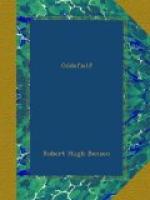“Gentlemen,” he said, “you have done like very good subjects and very good Christians; that is to say like very good Protestants; and now much good may their thirty thousand masses do them!” When he said this, he was referring to a piece of Dr. Oates’ lying evidence as to a part of the reward that they should get for killing the King. But I closed the door; for I could bear to hear no more. But afterwards I heard that they then adjourned for an hour or two, and that it was the Recorder—Sir George Jeffreys—that gave sentence.
When I presented myself, half an hour later, at Mr. Chiffinch’s lodgings, I had very nearly persuaded myself that all would yet be well. For I thought it impossible that any man to whom the report of the trial should be brought, could ever think that justice had been done; least of all the King who is the fount of it, under God. I knew very well that His Majesty would have to bear the brunt of some unpopularity if he refused to sign the warrants for their death; but he appeared to me to care not very much for popularity—since he outraged it often enough in worse ways than in maintaining the right. He had said to me, too, so expressly that no harm should come to the Fathers or to Mr. Grove and Mr. Pickering either; and he had said so, I was informed, even more forcibly to the Duke and those that were with him—saying that his right hand should rot off if ever he took the pen into his hand for such a purpose. I remembered these things, even while the plaudits of the crowd still rang in my ears, and the bitter cruelty of my Lord Chief Justice’s words to the jury. His Majesty, I said to myself, is above all these lesser folk, and will see that no wrong is done. And, besides all this, he is half a Catholic himself and he knows against what kind of men these charges have been made.
I was pretty reassured then, when I knocked upon the door of Mr. Chiffinch’s lodgings, and told the man who opened to me that I must see his master.
He took me through immediately into the little passage I had been in before, and himself tapped upon the door of the inner parlour; then he opened it, and let me through: for Mr. Chiffinch was accustomed by now to receive me at any hour.
He rose civilly enough, and asked me what I wished with him, so soon as the door was shut.
“The verdict is given,” I said. “I must see His Majesty.”
He screwed up his lips in a way he had.
“It is Guilty, I suppose,” he said.
I told him Yes;
“And I have never seen,” I said, “such a travesty of justice.”
He looked down upon the table, considering, drumming his fingers upon it.
“That is as may be,” he said. “But as for His Majesty—”
I broke out on him at that: for I was fiercely excited.
“Man,” I cried, “there is no question about that. I must see His Majesty instantly.”
He looked at me again, as if considering.




